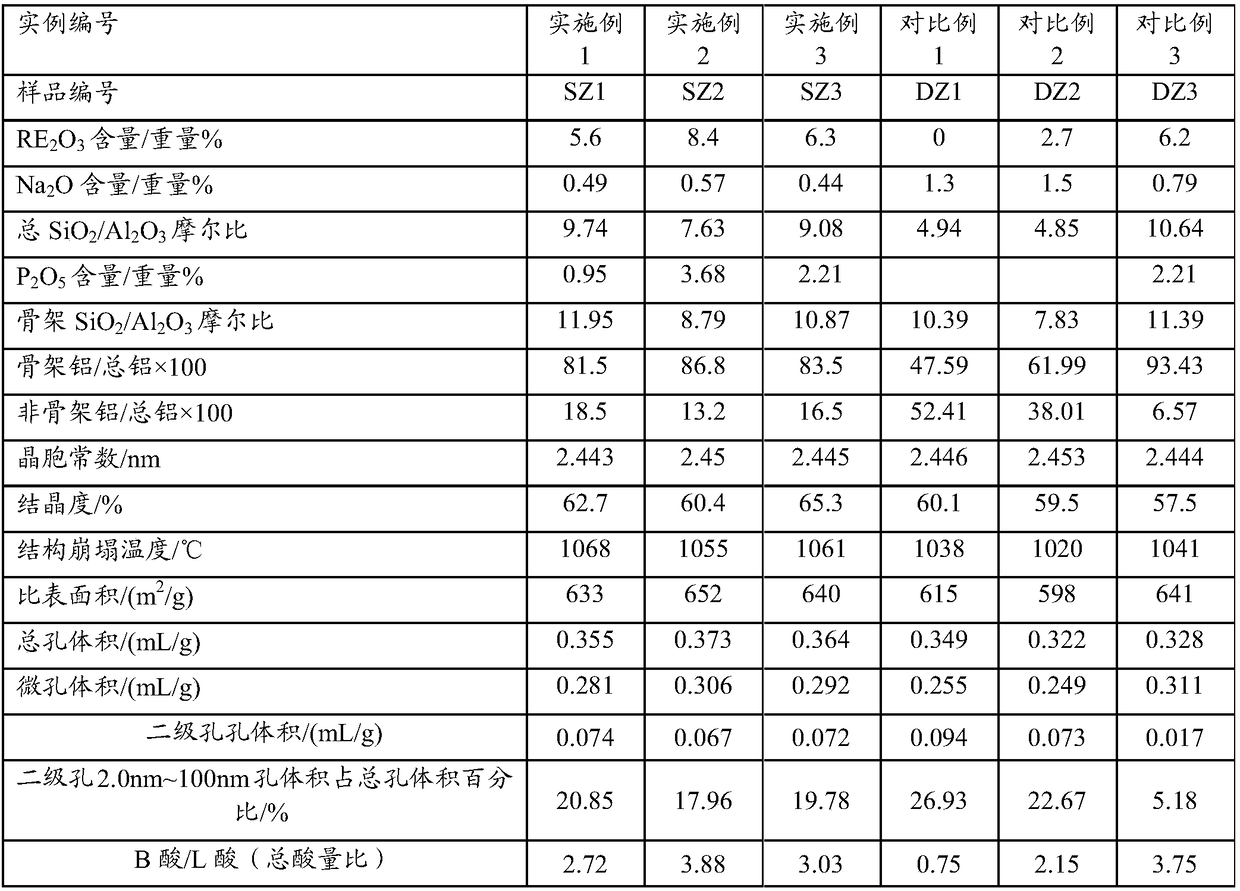Catalytic cracking catalyst
A catalytic cracking and catalyst technology, applied in catalytic cracking, physical/chemical process catalysts, molecular sieve catalysts, etc., can solve problems such as low crystallinity retention rate and specific surface area retention rate, zeolite lattice defects, and low conversion rate of heavy oil
- Summary
- Abstract
- Description
- Claims
- Application Information
AI Technical Summary
Problems solved by technology
Method used
Image
Examples
preparation example Construction
[0063] The preparation method of catalytic cracking catalyst provided by the present invention, one embodiment, the preparation method of the modified Y-type molecular sieve containing phosphorus and rare earth comprises the following steps:
[0064](1) carry out ion exchange reaction with NaY molecular sieve (also claiming NaY zeolite) and rare earth solution, filter, wash, obtain the Y-type molecular sieve of the conventional unit cell size containing rare earth that sodium oxide content reduces; Said ion exchange is usually stirred, Exchange at a temperature of 15-95°C, preferably 65-95°C, for 30-120 minutes;
[0065] (2) The Y-type molecular sieve with the rare earth-containing conventional unit cell size whose sodium oxide content is reduced is roasted for 4.5 to 7 hours at a temperature of 350 to 480° C. in an atmosphere containing 30 to 90% by volume of water vapor, and dried to obtain water A Y-type molecular sieve with a reduced unit cell constant content of less than...
Embodiment 1
[0076] Get 2000 grams of NaY molecular sieves (calculated on a dry basis) and add them to 20 liters of decationized aqueous solution and stir to make them evenly mixed. Add 600ml of RE(NO 3 ) 3 Solution (rare earth solution concentration is RE 2 o 3 Calculated as 319g / L), stirred, heated to 90-95°C and kept for 1 hour, then filtered, washed, and the filter cake was dried at 120°C to obtain a unit cell constant of 2.471nm and a sodium oxide content of 7.0% by weight. 2 o 3 A Y-type molecular sieve with a total rare earth content of 8.8% by weight is then calcined for 6 hours at a temperature of 390°C in an atmosphere containing 50% by volume of water vapor and 50% by volume of air to obtain a Y-type molecular sieve with a unit cell constant of 2.455nm. After cooling, Add molecular sieves to 6 liters of aqueous solution containing 35 grams of phosphoric acid, raise the temperature to 90°C, and perform phosphorus modification treatment for 30 minutes. After that, filter and wa...
Embodiment 2
[0081] Get 2000 grams of NaY molecular sieves (on a dry basis) and add them to 25 liters of decationized aqueous solution and stir to make them evenly mixed. Add 800 ml of RECl 3 solution (in RE 2 o 3 The calculated solution concentration is: 319g / L), stirred, heated up to 90-95°C for 1 hour, then filtered, washed, and the filter cake was dried at 120°C to obtain a unit cell constant of 2.471nm and a sodium oxide content of 5.5% by weight , with RE 2 o 3 A Y-type molecular sieve with a total rare earth content of 11.3% by weight was then calcined at a temperature of 450° C. under 80% water vapor for 5.5 hours to obtain a Y-type molecular sieve with a unit cell constant of 2.461 nm. After cooling, the molecular sieve was added to a solution containing 268 grams of In 6 liters of ammonium phosphate aqueous solution, the temperature was raised to 60°C, and the phosphorus modification treatment was carried out for 50 minutes. After that, the molecular sieve was filtered and was...
PUM
| Property | Measurement | Unit |
|---|---|---|
| Cell constant | aaaaa | aaaaa |
| Cell constant | aaaaa | aaaaa |
| Cell constant | aaaaa | aaaaa |
Abstract
Description
Claims
Application Information
 Login to View More
Login to View More - R&D
- Intellectual Property
- Life Sciences
- Materials
- Tech Scout
- Unparalleled Data Quality
- Higher Quality Content
- 60% Fewer Hallucinations
Browse by: Latest US Patents, China's latest patents, Technical Efficacy Thesaurus, Application Domain, Technology Topic, Popular Technical Reports.
© 2025 PatSnap. All rights reserved.Legal|Privacy policy|Modern Slavery Act Transparency Statement|Sitemap|About US| Contact US: help@patsnap.com



